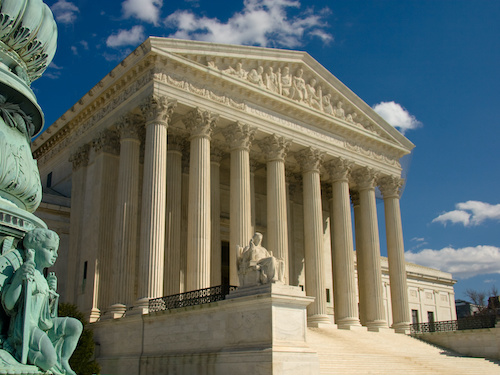“Comparing the case to Arthrex, IYM stated that ‘unconstitutionally appointed APJs adjudicated IYM’s patent rights, and the remedy should be the same as in Arthrex—the Board’s final written decision should be vacated, and the case remanded for a constitutionally valid proceeding.’”
 On Monday, the U.S. Supreme Court denied petitions for certiorari in two cases from the U.S. Court of Appeals of the Federal Circuit (CAFC): IYM Technologies LLC v. RPX Corporation and Advanced Micro Devices, Inc. and WhitServe LLC v. Donuts Inc. IYM asked the Supreme Court to grant review “to determine whether the Arthrex decision applies to all appeals that were pending when [the Arthrex decision] issued.” In the WhitServe petition, WhitServe asserted that a determination of patent ineligibility “necessitates impermissible fact-weighing at the pleading stage and eviscerates the statutory presumption of validity.”
On Monday, the U.S. Supreme Court denied petitions for certiorari in two cases from the U.S. Court of Appeals of the Federal Circuit (CAFC): IYM Technologies LLC v. RPX Corporation and Advanced Micro Devices, Inc. and WhitServe LLC v. Donuts Inc. IYM asked the Supreme Court to grant review “to determine whether the Arthrex decision applies to all appeals that were pending when [the Arthrex decision] issued.” In the WhitServe petition, WhitServe asserted that a determination of patent ineligibility “necessitates impermissible fact-weighing at the pleading stage and eviscerates the statutory presumption of validity.”
IYM Technologies LLC v. RPX Corporation and Advanced Micro Devices, Inc.
On March 9 and 13, 2020, the CAFC entered orders in IYM Technologies LLC v. RPX Corporation and Advanced Micro Devices, Inc. (IYM 1761) and IYM Technologies LLC v. RPX Corporation and Advanced Micro Devices, Inc. (IYM 1762), respectively. IYM’s U.S. Patent No. 7,448,012 (’012 Patent), which is directed to a process for optimizing an integrated circuit layout by operating on constraints between layout objects, was at issue in both IYM 1761 and IYM 1762. In July 2017, RPX filed two inter partes review (IPR) petitions, alleging that certain claims of the ’012 Patent were unpatentable as obvious. The U.S. Patent and Trademark Office (USPTO) Patent Trial and Appeals Board (the Board) issued written decisions holding that the asserted claims of the ‘012 patent were unpatentable as obvious. IYM appealed to the CAFC in both IYM 1761 and IYM 1762. The CAFC issued a summary order in IYM 1761, wherein the CAFC affirmed the Board’s final written decision without opinion, and issued an order in IYM 1762 dismissing the appeal and stating “that the appeal in IYM 1762 was moot in view of its decision in IYM 1761 affirming the Board’s finding that claims 1–14 of the ’012 patent are unpatentable.”
IYM filed petitions with the CAFC for panel rehearing and rehearing en banc in both IYM 1761 and IYM 1762, arguing that the CAFC’s decision in Arthrex, Inc. v. Smith & Nephew “represented an intervening change of law and that IYM’s patent rights were abrogated by an unconstitutionally appointed panel of APJs.” The CAFC denied both petitions. Subsequently, IYM filed a petition for a writ of certiorari asking the Supreme Court to review the decisions in both IYM 1761 and IYM 1762.
In particular, IYM asked the Supreme Court to grant review “to determine whether the Arthrex decision applies to all appeals that were pending when [the Arthrex decision] issued.” Comparing the case to Arthrex, IYM stated that “unconstitutionally appointed APJs adjudicated IYM’s patent rights, and the remedy should be the same as in Arthrex—the Board’s final written decision should be vacated, and the case remanded for a constitutionally valid proceeding.” The Supreme Court denied IYM’s request.
WhitServe LLC v. Donuts Inc.
WhitServe was the owner of U.S. Patent Nos. 5,895,468 and 6,182,078 (the ‘468 and ‘078 patents), which were directed to methods by which providers of professional services, using the internet, send reminders to clients and obtain responses from them. On appeal from the U.S. District Court for the District of Delaware, the CAFC affirmed the district court in finding the claims of the ‘468 and ’078 patents ineligible under 35 U.S.C. § 101. In particular, WhitServe filed suit against Donuts Inc. alleging infringement of selected claims of the ‘468 and ’078 patents. Donuts moved to dismiss the complaint arguing that all the claims of the patents were invalid because their subject matter is ineligible for patenting under § 101. The district court concluded that the claims were directed to “the abstract idea of preparing, sending, and receiving responses to due-date reminders for clients of professional-service [providers]” and determined that the claim elements, either individually or as an ordered combination, recited “nothing more than generic computer components employed in a customary manner,” and therefore do not transform the abstract idea into patent-eligible subject matter.
The CAFC agreed with the district court and issued an opinion in WhitServe LLC v. Donuts Inc. concluding that WhitServe’s claims were directed to an abstract idea and did not recite an improvement in computer functionality or other eligible matter. WhitServe argued at the CAFC, in part, that the district court should not have resolved the case at the pleading stage. However, the CAFC cited SAP America, Inc. v. InvestPic, LLC in explaining that factual questions relevant to a Section 101 analysis, similar to other legal questions based on underlying facts, “do not prevent a judgment on the pleadings when the pleadings and exhibits attached thereto show that there are no plausible factual disputes.” The CAFC also noted that “’the specification alone’ may suffice to resolve the patent-eligibility inquiry.” WhitServe filed a petition for a writ of certiorari with the Supreme Court requesting review.
In the petition, WhitServe argued that the petition should be granted because 1.) “[t]he decisions below are incompatible with fundamental and established holdings of this Court, and the resulting erroneous and burgeoning precedent is vitiating the patent right, and 2.) “[t]his is an emblematic case that is an appropriate vehicle to resolve the important federal question presented herein.”
In particular, WhitServe asserted its position that a determination of patent ineligibility over a patentee’s contrary factual assertions is inconsistent with the requirements of Rule 12 because “such a determination necessitates impermissible fact-weighing at the pleading stage and eviscerates the statutory presumption of validity” under 35 U.S.C. § 282(a).
WhitServe also asserted that due to the factual considerations underlying Section 101, “alone or in combination with the statutory presumption of 35 U.S.C. § 282(a), a patentee alleging patent infringement cannot be deemed to have asserted an invalid or ineligible patent at the pleading stage.”
In its response, Donuts, Inc. said that the Federal Circuit followed precedent in making a determination of patent eligibility at the pleading stage when “there are no disputed facts material to the issue of patent eligibility,” and further argued that “[e]ven if the Federal Circuit’s determinations on the application of the Alice test here were incorrect (which they were not), Petitioner has not shown how this case has a broader impact sufficient to warrant certiorari.” The High Court ultimately agreed.
Image rights acquired through AdobeStock.

![[IPWatchdog Logo]](https://ipwatchdog.com/wp-content/themes/IPWatchdog%20-%202023/assets/images/temp/logo-small@2x.png)

![[[Advertisement]]](https://ipwatchdog.com/wp-content/uploads/2023/01/2021-Patent-Practice-on-Demand-1.png)
![[Advertisement]](https://ipwatchdog.com/wp-content/uploads/2024/04/UnitedLex-May-2-2024-sidebar-700x500-1.jpg)
![[Advertisement]](https://ipwatchdog.com/wp-content/uploads/2024/04/Artificial-Intelligence-2024-REPLAY-sidebar-700x500-corrected.jpg)
![[Advertisement]](https://ipwatchdog.com/wp-content/uploads/2024/04/Patent-Litigation-Masters-2024-sidebar-700x500-1.jpg)

![[Advertisement]](https://ipwatchdog.com/wp-content/uploads/2021/12/WEBINAR-336-x-280-px.png)
![[Advertisement]](https://ipwatchdog.com/wp-content/uploads/2021/12/2021-Patent-Practice-on-Demand-recorded-Feb-2021-336-x-280.jpg)
![[Advertisement]](https://ipwatchdog.com/wp-content/uploads/2021/12/Ad-4-The-Invent-Patent-System™.png)






Join the Discussion
3 comments so far.
Anon
November 21, 2020 08:40 amGood points Curious.
Curious
November 20, 2020 11:06 amAs if SCOTUS and the CAFC cares one whit.
When I’m told that conservatives are pro-patent, I yet again recall the fact that conservatives have held control of the Supreme Court for as long as I can remember. With that in mind, the question that begs to be asked is if conservative judges are pro-patent, why has SCOTUS been so hostile to patents? I believe the answer leads to my point that only some conservatives are pro-patent and the patent community shouldn’t rely upon conservatives alone to preserve our patent system.
And should we lose Director Iancu and his colleagues . . .
For what, precisely? If you have a patent application in 3600, I doubt you’ll have seen a difference. Regardless, as I have written more than once already, getting a patent out of the USPTO means little if the patent is unenforceable in the courts.
Not that I had high hopes for any petition before SCOTUS, but the WhitServe LLC v. Donuts Inc. presented an issue before SCOTUS that they should have taken up. The Federal Circuit has eviscerated longstanding 12b6 case law and ignored the presumption of validity of patents by allowing patents to be invalidated on the pleadings alone.
Pro Say
November 18, 2020 03:31 pm“the resulting erroneous and burgeoning precedent is vitiating the patent right”
Harumph.
As if SCOTUS and the CAFC cares one whit.
These truly are the dark days for American innovation.
And should we lose Director Iancu and his colleagues . . .